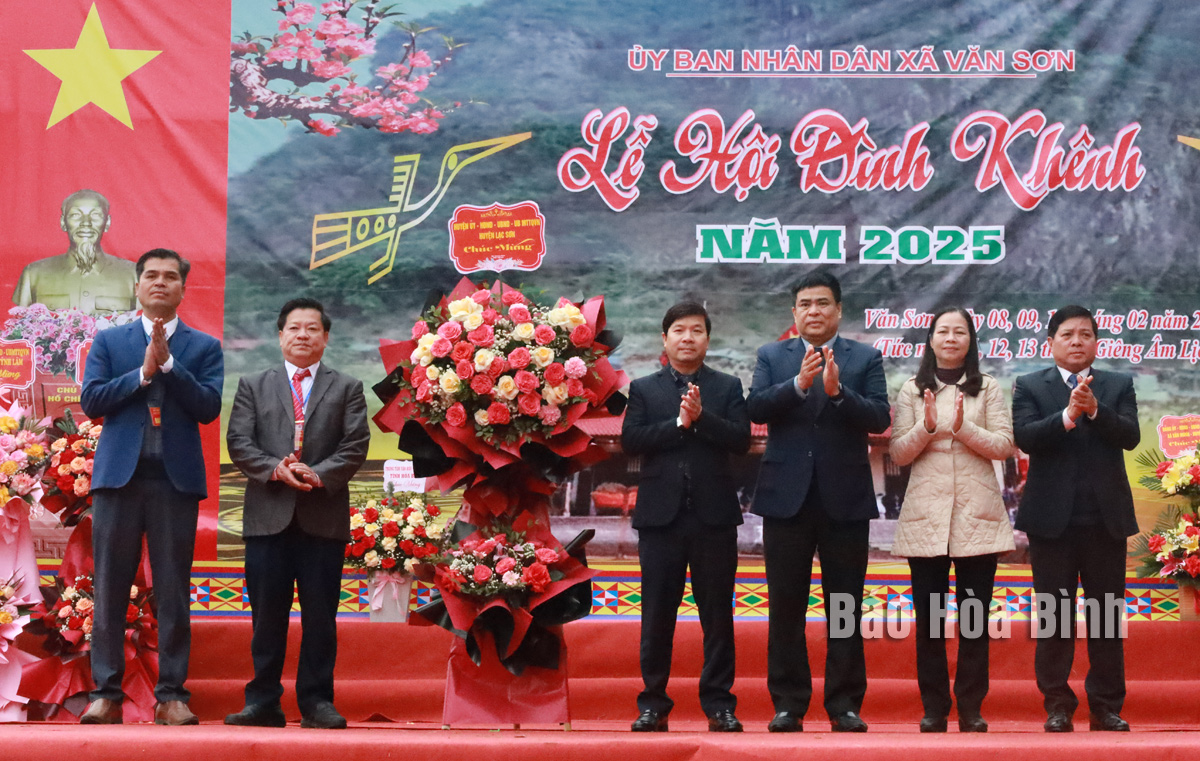
On February 9th, i.e. the 12th of Lunar January, the People's Committee of Van Son Commune (Lac Son) organized the opening ceremony of the Festival of Khenh Communal House of the Year of the Snake 2025. There was the attendance of the delegates from the districts and the city in the province, along with a large number of tourists and the local people.
Lac Son District’s leaders presented flowers to congratulate the Festival of Khenh Communal House in 2025.
Khenh Communal House has existed for a long time, worshiping the following people: Mr. Chuong Tin, Mrs. Trieu An, the two leaders of Muong people who fought against Ngo invaders; Mr. Tuc Co, Mrs. Quan Da, the General Cai Do, Cai Dao, who were the generals of the two above people; Mr. Hien, Mr. Hieu, the Gods (Thanh Hoang) of Muong Khenh; 9 Da Chua Na people, the first people to reclaim the land and establish Muong Khenh.
Being restored since 2018 and ranked as a provincial historical and cultural relic since 2020, the Festival of Khenh communal house is periodically held on January 12-13 every year to pray for the favorable weather, bountiful crops, health and happiness for the people in the village, and to create an atmosphere of solidarity and excitement when entering the new production season.
Visitors welcome the lucky rice flowers, which symbolize good luck and fortune in the new year.
In the space of the New Year festival, visitors and the local people have witnessed the unique rituals and ceremonies: carrying the lucky rice flowers and offering lucky rice flowers, praying for birds, spinning the Da Ha statue, knocking on the pole, pulling the festival...; experiencing a unique cultural and sports festival with a night of cultural exchange, folk games and volleyball competitions.
The Festival of Khenh communal house aims to preserve, conserve and promote the good customs and practices; promoting, advertising and introducing to tourists the humanistic values of the festival.
With an increasingly vibrant and widespread emulation movement aimed at building cultured residential areas and cultured families, Yen Thuy District has been making steady progress toward improving both the material and spiritual well-being of its people, while fostering a civilized, prosperous, beautiful, and progressive community.
Once lacking recreational spaces and community facilities, Residential Group 2 in Quynh Lam Ward (Hoa Binh City) has recently received attention for the construction of a new, spacious, and fully equipped cultural house. The project followed the model of state support combined with public contributions in both labor and funding.
The "All people unite to build cultural life" movement, which has been effectively integrated with Kim Boi district’s socio-economic development goals, is fostering a lively spirit of emulation across local residential areas, hamlets, villages, public agencies, and enterprises. In addition, through the initiative, traditional cultural values are being preserved and promoted, while community solidarity and mutual support in poverty reduction and economic development are being strengthened.
A working delegation of the Hoa Binh provincial People’s Committee led by its Permanent Vice Chairman Nguyen Van Toan on June 11 inspected the progress of a project to build the Mo Muong Cultural Heritage Conservation Space linked to tourism services in Hop Phong commune, Cao Phong district.
Born and growing in the heroic land of Muong Dong, Dinh Thi Kieu Dung, a resident in Bo town of Kim Boi district, in her childhood was nurtured by the sweet lullabies of her grandmother and mother. These melodies deeply imprinted on her soul, becoming an inseparable part of her love for her ethnic group's culture. For over 20 years, this love for her hometown has driven Dung to research, collect, and pass down the cultural values of the Muong people to future generations.
In the final days of May, the Ethnic Art Troupe of Hoa Binh Province organized performances to serve the people in remote, mountainous, and particularly disadvantaged areas within the province. These were not just ordinary artistic shows, but they were the meaningful journeys aimed at spreading cultural values, enhancing the spiritual life of the people and contributing to the preservation of ethnic minority cultural identities.



